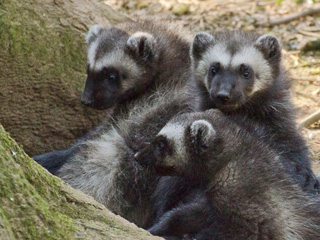Wolverine triplets finally emerge from den at Cotswold Wildlife Park

Meet Sunshine, Liv and Gutt - the Park’s new Wolverine cubs. After spending approximately nine weeks hidden away in their den, the rare cubs are beginning to venture out and explore their new woodland enclosure under the watchful eye of parents Sarka and Sharapova.
Cotswold Wildlife Park made history in 2012 as the first collection in the UK to successfully breed Wolverines (Gulo gulo) in captivity. These new arrivals are Sarka and Sharapova’s second litter and are testament to the Park’s excellent European Endangered Species Programme (EEP). Only around eighty Wolverines are believed to exist in captivity worldwide and breeding is notoriously difficult with this species, so the new cubs are encouraging news for future generations.
Keepers were unsure exactly how many cubs had been born until mother Sharapova started bringing the youngsters out of the den. Jamie Craig, Curator of Cotswold Wildlife Park and member of the EEP committee for Wolverines, commented: “Once the female enters her den, we are pretty confident that the kits have arrived. She is an excellent mother, only leaving the kits for very brief periods to eat and drink. Once the kits are old enough, she will allow them out to investigate their surroundings but always under her vigilant eye. We were delighted to be the first UK collection to breed this species and in many ways, it is even more rewarding to repeat our success.”
The tiny kits are born blind and covered in white fur with a pungent waxy substance on their pelage. This acts as a great defence against predation while the kits are vulnerable*.
A Wolverine’s start in life is a unique one. Adult females have a fascinating reproductive strategy known as embryonic diapause or delayed implantation. The embryo does not immediately implant in the uterus, but is maintained in a state of dormancy which allows pregnant females to fine-tune births and wait for the best possible conditions. Reproduction is hugely energetically expensive for any animal. If the environmental conditions aren’t able to support a female through the intense periods of pregnancy and nursing, it makes no sense to put energy into giving birth to young that may not survive. Diapause can last up to ten months in Wolverines.
Cotswold Wildlife Park is open daily from 10am (except Christmas Day)
Nr. Burford, Oxfordshire OX18 4JP
Explore Gloucestershire
2 June 2015
*Source: The Wolverine Way by Douglas Chadwick (Patagonia Publications, 2012).
For further information.
OTHER NEWS
